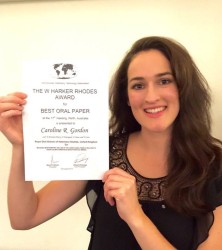Latest News


 This development is the brainchild of Drs Dave Keenan, Andrea Ritmeester and Lee Morris. The team at MVS EquiBreed will include Drs Lee Morris, Ria Harteveld and includes the support of the equine repro team from MVS Equine.
This development is the brainchild of Drs Dave Keenan, Andrea Ritmeester and Lee Morris. The team at MVS EquiBreed will include Drs Lee Morris, Ria Harteveld and includes the support of the equine repro team from MVS Equine.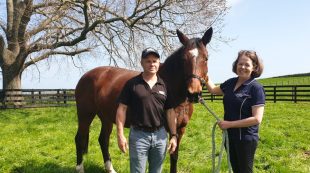
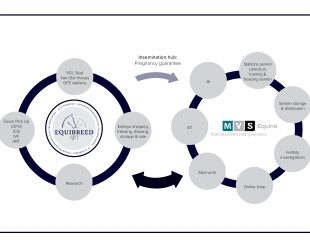
MVS Equine’s new purpose-built NICU for foals
The MVS Equine NICU is a fantastic new, purpose-built edition to the clinic’s facilities for the 2022 season, housing neo-natal foals and their dams requiring 24/7 care. Take a virtual tour below.
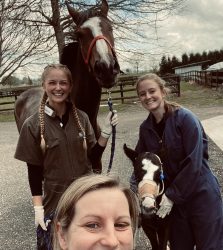
MVS Equine
Some of our 2022 season team enjoying a bit of sunshine!
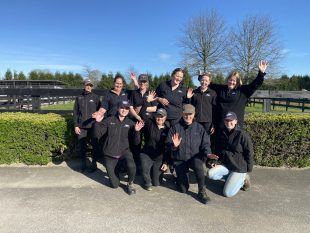
COVID19 – Level 2
COVID19 – Level 3
COVID19 – Level 4
Dry July
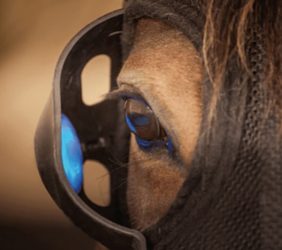
Atypical Myopathy – June 2020
Atypical myopathy is a painful and potentially fatal muscle disease caused by a toxin found in the seeds of trees of the genus Acer, for example the sycamore tree and box elder tree. The disease is most commonly seen at this time of the year so it is important to take steps to prevent it!
Horses that develop AM are often kept on sparse pastures containing an accumulation of dead leaves, wood, and trees, and these animals often are not fed any supplementary hay or feed. The seeds are not palatable for horses but animals grazing on poor quality pasture may ingest sufficient amounts to result in signs of disease.
Prevention:
Horse owners are advised to identify these trees on or near grazing land and take steps to prevent the seeds falling where they are in reach of horses, including:
- Restrict access to seeds by using temporary fencing
- Ensure horses have access to good quality uncontaminated pasture
- Move horses off pasture at times of risk
- Provide supplementary feed in the field to minimize the risk of horses being tempted to ingest seeds
- Be aware that a field without sycamore trees can still contain seeds spread by high winds or flood waters
- Monitor horses closely to pick up any signs of a problem in the early stages
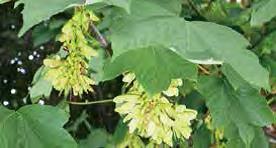
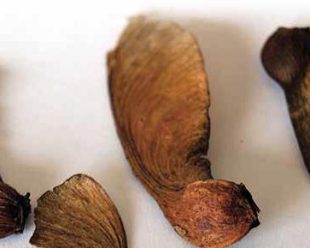
MVS Equine at COVID-19 Alert Level 2
On Thursday, 14th May when the country drops to alert level 2 we will continue to provide all of our usual essential services in a way that is safe for both our clients and our staff.
As outlined by the Government we must continue to maintain social distancing and follow strict hygiene protocols to keep everyone safe, and we must also maintain a system for contact tracing recording. This means every visitor or client to the clinic will be asked to sign in and out to ensure we are meeting our contact tracing obligations.
The clinic building will be open to clients however this will be on a restricted basis. This means only one client at a time will be permitted in reception and we continue to encourage you to phone ahead of time to coordinate the collection of supplies and dropping off of samples outside the clinic. We ask that clients accompanying horses to remain in their vehicles during treatment unless required to be present.
If you have recently travelled, have had contact with a known infected person, are exhibiting cold or flu-like symptoms or are currently in self isolation for any reason (confirmed COVID or COVID household) please stay home! If your horse must be seen please let us know – it must be brought in by someone else and will be taken off that person by a nurse and handled with PPE. Please be aware that providing veterinary care under these conditions takes more time and effort than normal.
We understand how difficult and challenging this period has been for so many and we want to say a heartfelt thank you to you all for your positivity and continued support.
MVS Equine at COVID-19 Alert Level 3
On Tuesday the 28th April when the country drops to alert level 3 we move from being able to provide emergency veterinary services only to being able to provide all of our usual essential services for your horses and businesses. This means we can start booking in work that we routinely perform this time of year, including branding, castrations, lameness work-ups and surgeries.
However, the Government is very clear that we must provide these services in a way that safe for both our clients and our staff. We must maintain social distancing and our services will remain contactless to keep everyone safe. This means our hospital building will continue to be a staff-only zone like it was in Level 4, and there will be no physical interaction between staff and clients. There is a strict no-hand-shake policy in force and hands must be sanitized frequently. All horses will be taken from you on arrival at the hospital and held by a nurse for the exam. Please remain in your vehicle for the duration of the exam/procedure. If you need to collect supplies or drop off samples please phone ahead of time in order to coordinate a collection time – all supplies will be collected from outside the building.
If you have recently travelled, have had contact with a known infected person, are exhibiting cold or flu-like symptoms or are currently in self isolation for any reason (confirmed COVID or COVID household) please stay home! If your horse must be seen please let us know – it must be brought in by someone else and will be taken off that person by a nurse and handled with PPE.
Please be aware that providing veterinary care under these conditions takes more time and effort than normal. There are many procedures, bookings and services that we haven’t been able to provide during the lock- down and we are now going to be pushed to provide all these services at once. We will make every effort to book you in as soon as possible and ask for your patience as we do our best to get up and running again swiftly.
COVID-19
Veterinary Care has been listed as an essential service during the COVID-19 Alert level 4 lockdown period over the next 4 weeks. Currently, until further notice, we are working under the guidance of the New Zealand Veterinary Association while essential processes and services are clarified by the Government.
Effective from midnight Wednesday 25/03/20 until midnight Monday 27/04/20:
• All non urgent consults will be cancelled
• Services currently ‘permitted’ include:
o Emergencies: including colic, foalings, severe respiratory distress, fractures, severe or non-weight bearing lameness, choke, severe haemorrhage, acute illness, major injuries/wounds (especially near vital structures/joints), eye injuries, euthanasia.
o Non-emergency services where an absence of veterinary care would compromise animal welfare: including severe respiratory conditions, non-routine dentistry involving inability to eat and weight loss, severe weight loss, neurological conditions, severe skin conditions, wounds and injuries, abortion, ongoing case management, post op checks.
o Access to veterinary medicines (vaccines, anti-parasitics, antibiotics, pain relief, mineral supplements etc.)
o Animal health and welfare consultancy (conducted by phone)
We are going to minimum staffing levels to enable us to provide essential services while managing exposure of staff to COVID-19. A veterinarian will be available 24 hours a day, 7 days a week for emergency services as per our usual out-of-hours service; however, the equine hospital will be shut during this time.
We ask that all enquiries relating to emergencies and medication requirements to be made over the phone 07 888 8193 where further guidance will be provided based on the nature of your call. If you need a visit from a vet, please don’t be upset if we ask if you have been overseas in the last fortnight, have been in close contact with someone who has/or you have had flu/cold symptoms. Please remember to stay over 2m distance from veterinary staff during any visit.
If you need veterinary supplies please phone us ahead of time. A pick up time will be organised for these – please do not drop into the clinic as we will not be open. Please remember that the services we are able to provide may well change over the coming days/weeks. We will continue to update you as we work on the details of these services. We ask for your patience and trust we have the wellbeing of your horses as our top priority. If you have any queries please do not hesitate to call us.
Inter Dominions 2019 at Alexandra Park
Matamata Vet Services IDOM Pacing Champs H6 (Mobile Pace) – Race 8, Alexandra Park, 6 December 2019
Winner – Cruz Bromac
“Race Images Photo”
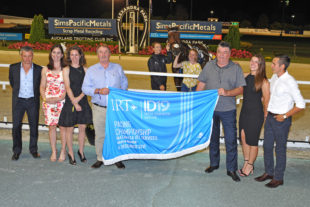
Animal Welfare Matters
On 1 October this year new animal welfare regulations come into effect. Check out the information here – www.mpi.govt.nz/animalregs
If you’re already doing it right, you won’t see a lot of change. Most of the regulations reflect existing standards, but a few do set new rules and requirements, such as prohibiting tail docking of cattle and dogs.
Regulations make it easier for MPI and the SPCA to take action against animal mistreatment. New penalties such as fines will be issued for certain actions. We will continue to prosecute the worst offenders under the Animal Welfare Act.
We’re making life better for animals, and you can help others get it right too.
- Check! Are you doing it right? Encourage others to check too – www.mpi.govt.nz/animalregs
- Ask! Email us your questions – animalwelfare@mpi.govt.nz
- Tell! Call us about an animal welfare issue – 0800 00 83 33
Key messages for horse owners: Companion horses
Regulation18: Horses tethered for the purpose of grazing.
Tethering your horse for grazing is not recommended. If you have to tether your horse for grazing, your horse must have constant access to a supply of water, food, shade, and protection from heat and cold. If you don’t provide this to horses tethered for grazing, you can be fined $300.
Check your horses regularly when tethered. Tethering for grazing is not appropriate for long periods of time, as horses need exercise.
Regulation 19: Use of equipment that may injure horses.
Any equipment used on a horse must not cause injuries such as cuts and abrasions that bleed or discharge, or swelling around the head and neck.
Equipment used on a horse must ensure the horse is able to breathe and drink normally. Equipment can include, but is not limited to, halters, bridles, lead ropes, bits, and nosebands. Keep your equipment clean, and ensure saddles and covers are
fitted correctly. Horses that wear equipment need to be checked regularly/daily. If you use equipment that causes injury to horses you can be fined $300.
Regulation 20: Persons must not strike a horse on its head.
Horses must not be struck on the head, with hands or any other object. If you strike a horse on its head you can be fined $500.
Regulation 54: Castrating horses.
Castration is a painful, surgical procedure that must be carried out by a veterinarian using local or general anaesthetic. If a horse is castrated without local or general anaesthetic you could face a criminal conviction and a fine of up to $5000 for an individual or $25,000 for the business.
Key messages for horse owners: Racing and sport horses
Regulation 18: Horses tethered for the purpose of grazing.
Tethering your horse for grazing is not recommended. If you have to tether your horse for grazing, your horse must have constant access to a supply of water, food, shade, and protection from heat and cold. If you don’t provide this to horses tethered for grazing, you can be fined $300.
Check your horses regularly when tethered. Tethering for grazing is not appropriate for long periods of time, as horses need exercise.
If you need to tether your horse, you’ll be fine as long as you ensure that the tether you use
- Is an appropriate length and material to allow for normal breathing and drinking.
- Keeps the animal from being caught up on nearby objects and injured.
Otherwise you can be fined $300.
Regulation 19: Use of equipment that may injure horses.
Any equipment used on a horse must not cause injuries such as cuts and abrasions that bleed or discharge, or swelling around the head and neck. All equipment used on a horse must ensure the horse is able to breathe and drink normally.
Use equipment that is approved for use in your sport. Equipment that is not clean, ill fitted to your horse, or not used appropriately can cause injuries and swelling, or result in the horse experiencing pain or distress.
If you use equipment that causes injury to the horse, or swelling around the head or neck, you can be fined $300.
Regulation 20: Persons must not strike a horse on its head.
If you strike a horse on the head you can be fined $500
Regulation 54: Castrating horses.
Castration is a painful, surgical procedure that must be carried out by a veterinarian using local or general anaesthetic. If a horse is castrated without local or general anaesthetic you could face a criminal conviction and a fine of up to $5000 for an individual or $25,000 for the business.
Regulation 48: Prodding animals in sensitive areas.
You must not strike or prod an animal in sensitive areas with a goad. Failure to comply with this regulation can result in a $500 fine. A goad is any object used to make an animal move. Electric prodders are not recommended for use at all.
MVS Success at the 2018 New Zealand Equine Veterinary Association Conference
We are very proud of three of our veterinarians, Barbara Hunter, Jonathan Tam and Therese Ritson, who presented at the New Zealand Veterinary Association conference in the Equine stream.
A massive congratulations also goes to Jonathan who won the award for Best Young Practitioner Presentation at the New Zealand Equine Veterinary Association Conference for his presentation on POD (palmar/plantar osteochondral disease).
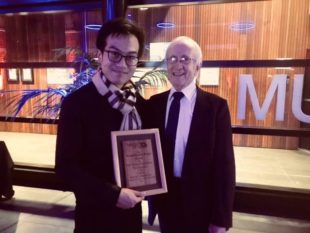
MVS Success at the 2017 New Zealand Equine Veterinary Association Conference
Congratulations to MVS Equine Veterinarians, Cordelia Francis and Andrea Ritmeester, for their outstanding achievements at the 2017 New Zealand Equine Veterinary Association Conference.
Cordelia won the Massey Award for Best Practitioner Presentation, presented by Prof Chris Riley, and Andrea received the Brian Goulden Prize awarded to an Outstanding NZ Equine Veterinarian, presented by Neil Houston, president of the NZEVA.
Andrea has also been chosen to be the next president of the NZEVA, commencing in June 2018.
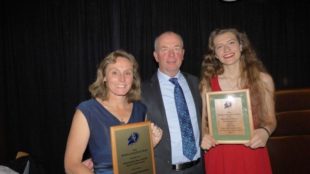
News all good for Valachi chief
Kevin Hickman’s breeding operation has welcomed another highly valuable addition while his prospects for the new racing season also look particularly bright.
In England overnight, the Valachi Downs principal’s former crack race mare Silent Achiever foaled to Galileo’s unbeaten champion son Frankel, already a Group One producer at stud.
“He’s a strong, good-boned colt and just as impressive as his full-sister last year,” Valachi manager Jonathan Scully said. “We’re all absolutely rapt and Silent Achiever loves being a Mum so that’s great.”
Trained throughout her career by Roger James, Silent Achiever won 10 races, including the Gr.1 New Zealand Derby and the Gr.1 New Zealand Stakes and in Australia the Gr.1 Ranvet Stakes and the Gr.1 BMW.
Meanwhile, last season’s Gr.1 New Zealand 2000 Guineas winner Ugo Foscolo was a runaway winner at the trials on Tuesday morning as he prepares for a return to racing from the stable of Gai Waterhouse and Adrian Bott.
“I’ve been talking to Adrian and they put Blake Shinn on him and it was a nice trial over 1000 metres,” Scully said. “He pulled eight or 10 lengths away from them at the line.
“He was under a good hold throughout so things are looking good. He’ll probably have another trial and then maybe kick off in a Group Two somewhere.
“He will be hanging around Sydney to see just how he does come up and then we’ll decide whether he goes down to Melbourne to have a go at Winx or not.”
Hickman also has high hopes for Ugo Foscolo’s regally-bred stablemate Honfleur, a half-sister by Fastnet Rock to the Group One winners Shamrocker and Rock Diva.
“She’s had a couple of trials and they’ve seen enough in her to send her straight to Melbourne for her first start,” Scully said. “She looks a million dollars, a lovely filly.” – NZ Racing Desk.
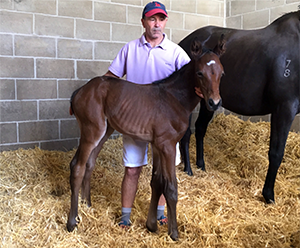
Ex-Kiwi on right track for Final
Nikita Beriman’s enthusiasm for next week’s Winter Championship Final at Flemington increased on Saturday.
The Group 1-winning jockey saw My Paisann announce himself a genuine contender for the $150,000 Listed event with an impressive win at Caulfield.
The New Zealand recruit, who is prepared by Lisa Enright at Mornington, scored a last-stride win in the $100,000 SECUREcorp Handicap (1400m).
“The Grand Final is next week, so this was an added bonus,” Beriman said.
“I actually went down and galloped this horse on Wednesday and was rewarded with the ride today, so I’m happy to stay on board.”
The son of Roc de Cambes took his record to two wins from seven starts with the victory. Backed from $31 into $19 before starting at $21, he scored by a half-head over Revolving Door ($5) with the heavily-backed favourite Enigman ($4.20 to $3.40) third.
The Caulfield victory followed second placings at Ballarat and Sandown at his first two runs in Australia.
His final two runs before leaving New Zealand were a fifth placing in the Group 1 Sires’ Produce Stakes (1400m) and a fifth in the Listed Champagne Stakes (1600m).
My Paisann’s win atoned for a near-miss for Beriman earlier in the day, the jockey forced to settle for a short-neck second placing aboard Swan Hill on-pacer Don’t Get Excited in the $60,000 Sheen Group Plate (1600m).
Beriman led until the final few strides aboard the Nathan Hobson-trained gelding, who started at $21, before being nabbed by the Beau Mertens-ridden Coldstone.
“I did get a little bit excited at the 100, but I heard Beau coming and he ran tremendous race, so you have to be happy with that,” she said.
– racingnews.co.nz
My Paisann Photo: Darryl Sherer
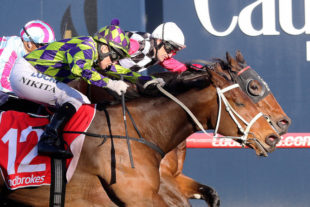
Gastroscopy Day at MVS Equine – 20 June 2017
Does your horse have stomach ulcers? MVS Equine is hosting a ‘gastroscopy day’ on the 20th June 2017 at the clinic to promote diagnosis of stomach ulcers. Please contact the clinic to book an appointment time.
Click on the link below for more information.
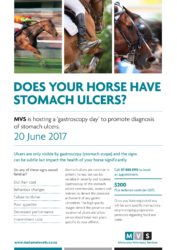
Another two-mile chance for accomplished stayer
Connections of the proven distance performance Mister Impatience aren’t letting any two mile chances pass by.
They haven’t wasted any time in sending the stayer back to Australia and he will take his place in Saturday’s $A2 million Gr.1 Sydney Cup at Randwick.
“He was always going to end up back there and he was doing so well that the owners and Mike (Moroney) decided to have a go,” Ballymore Stables racing manager Nick Fairweather said.
Although Mister Impatience raced well below expectations in the Gr.1 Auckland Cup for Moroney and his Matamata co-trainer Pam Gerard, his condition can’t be faulted.
“He got into a good position, but he never fired,” Fairweather said. “It was disappointing because we thought he was going as well as ever and his run for third in the Avondale Cup had been very good.
“He’s come through his racing well and he’s a dead-set stayer so it’s worth him having a go at the Sydney Cup.
“As long as he runs well he’ll probably have another crack at the Queensland Cup.”
Mister Impatience won the 3200 metre event in 2015 and success in the Gr.2 Wellington Cup five months later confirmed his distance prowess. He also has a 3000 metre victory at Ballarat to his credit.
Meanwhile, Dreamcrafter returned to the stable last week and she will make one more appearance as a three-year-old.
“She’s going to run in the Valachi Downs Championship Stakes at Ellerslie,” Fairweather said.
Dreamcrafter finished runner-up in the Gr.3 Sunline Vase before the Gr.1 New Zealand Oaks distance proved beyond her at Trentham. – NZ Racing Desk.
Mister Impatience Photo: Trish Dunell
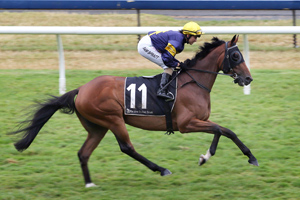
Second Stakes Winner for Roc De Cambes
Lightly raced four-year-old Consommateur (NZ) (Roc de Cambes) tackled stakes company for the first time in Saturday’s $150,000 Group III Bradford Black Epona Stakes (1900m) at Rosehill, and she came out a winner.
Bought from The Oaks Stud’s draft at the 2014 Select Sale for $30,000, Consommateur came from off the pace in the fillies and mares’ feature and powered through the wet ground to win by two and three-quarter lengths.
The win was Consommateur’s third from six career starts, and she has placed in all of the other three. Her prize-money earnings now stand at A$128,600.
“Her whole aim this preparation was this race,” trainer Mick Kent said. “She is owned up here by a good client of mine, Geoff Evers. We bought her in New Zealand.
“She is out of a Zabeel mare. She has taken her time and is a very big mare. She will be better next year.”
Consommateur was bred by The Oaks Stud and is a half-sister to the stakes placegetter Single Act (NZ) (Bachelor Duke).
Offered by The Oaks stud at the 2014 Select Sale, Consommateur was bought by NZB as agent for $30,000.
Bred in New Zealand by The Oaks Stud, Consommateur was purchased for the Kent stable after an early trial victory. A half-sister to the stakes placed Single Act, she is out of the Zabeel mare Consumer whose dam is a half-sister to the Group I winners Magic Of Sydney (Spring Champion Stakes) and Daney Boy (Karrakatta Plate).
Consommateur becomes the second stakes winner for The Oaks Stud’s Roc De Cambes after Group 1 Toorak Handicap winner He’s Our Rokkii.
story from breednet.com.au (photo – Steve Hart)
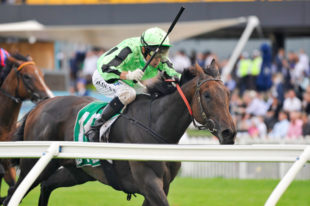
Chenille delivers perfect get well message
Tony Pike delivered the perfect get well message to his hospitalised father Wayne when he saddled up Chenille to win the country’s premier staying race, the $500,000 Barfoot & Thompson Auckland Cup, at Ellerslie this afternoon.
The big mare’s dominant victory capped a roller-coaster week for the Pike family, beginning with the postponement of Saturday’s originally scheduled Cup day programme. On Monday Wayne Pike underwent cancer surgery in Hamilton’s Braemar Hospital and this afternoon he, wife Vicki and grandchildren Molly and Oliver watched the Ellerslie action unfold via Trackside TV.
“When the rain started on Friday we thought we had done our chips,” Tony Pike recalled. “The postponement to today put us back in the game and the weather played its part to give us the track she needed.
“Wayne had been all set to come to the races on Saturday and then the first thing he said when they postponed was that he might still be able to get out of his hospital bed and be here today.
“There was no chance of that – it was a big operation and he only got out of ICU yesterday, but this is great, it will have done him a power of good.”
Chenille, who became the thirteenth Group One sired by veteran stallion Pentire, was bred by Tony, his wife Kirsten and Wayne and Vicki Pike and is raced by them in partnership with old friends Graeme and Jackie Capes.
The other key contributor to the big win was jockey Leith Innes, who had wasted hard all last week to make Chenille’s 53-kilogram handicap and then had to remain on light rations for another five days.
The saving grace for Innes was that Chenille gave him an armchair ride – albeit a little keen – on the way to her three-quarter-length win over fellow lightweight mare El Pistola. Innes had his mount travelling sweetly one out in midfield before easing her into the clear with 800 metres to run.
Already the $3.90 favourite, it was clear she was the horse to beat as she loped up wide out on the turn and with her tongue hanging out the left side of her jaw, she kept going resolutely for a convincing win.
“She over-raced in the run but she always felt strong,” said Innes. “I had no option but to let her roll into it and even though she got to the front sooner than I would have liked, she always had them covered.
“Wins like this make it all worthwhile and it’s great for the Pikes, who have been such big supporters for me.”
Tokoroa mare El Pistola was game in defeat after making the early running and then racing in a trail, while even braver was third placegetter Jacksstar, who ran all the way to the line but pulled up with a bowed tendon.
story and photo from The Informant
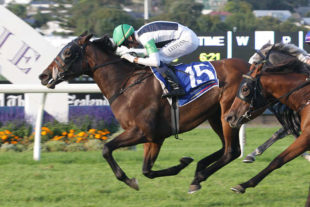
Matamata Racing Club ‘2017 Junior Fashion In The Field’
MVS Equine Veterinarian, Andrea Ritmeester, presenting Lennox Thomson with 3rd place in the Matamata Racing Club ‘2017 Junior Fashion In The Field’ 3-4yr old division. Doesn’t he look great?!
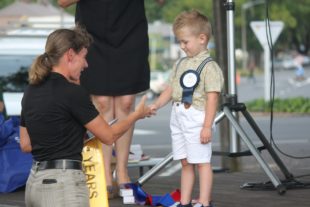
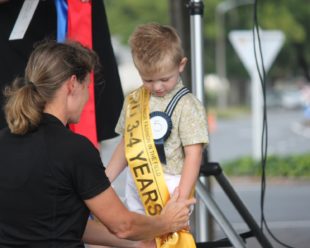
She Brings Joy (NZ) Claims Royal Stakes
With a perfectly timed charge, She Brings Joy (NZ) (Sebring) got up in the last stride for a thrilling win in the fifth leg of the New Zealand Bloodstock Filly of the Year Series, the $100,000 Group 2 Stella Artois Royal Stakes (2000m) at Ellerslie on Sunday.
In a tactically run race, Adis (NZ) (Mastercraftsman) dictated terms from in front and kicked strongly in the straight. The 20-to-one outsider appeared to have stolen the race. But She Brings Joy lengthened stride in the last 150 metres and snatched victory by a half-head.
It was the second year in a row that trainer Stephen Marsh and jockey Danielle Johnson won the Royal Stakes, having won it in 2016 with the subsequent Filly of the Year Sofia Rosa (NZ) (Makfi).
“I can’t believe this horse was still a maiden,” Marsh said. “She’s been probably our most promising maiden for a long time.
“I thought she’d win first up and then second up but it’s just those bad draws that have plagued us. Finally today she drew a barrier.”
Bred and raced by Kevin Hickman, She Brings Joy has had four starts for one win, one placing and more than $60,000 in prize-money.
She Brings Joy picked up 8 Filly of the Year Series points for Sunday’s win, boosting her to third place on the points table behind Volpe Veloce (Foxwedge) and La Diosa (NZ) (So You Think).
Runner-up Adis collected 4 points to sit in seventh place on the table, with the third-placed Grand Soleil (NZ) (Savabeel) moving on to the table with 2 points.
story and photo from NZ Racing
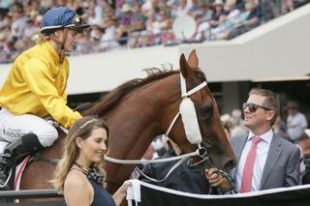
Atypical Myopathy – NZ Horses at risk if they ingest sycamore or box elder seeds
Horses in New Zealand should be grazed away from areas where they might ingest the seeds of sycamore maple and box elder trees, a veterinary journal report advises.
Horses that ingest the seeds are at risk of developing the serious muscle disease atypical myopathy. Clinical signs may include muscle weakness or stiffness, colic-like symptoms, laboured breathing, dark red-brown urine, recumbency or even sudden death.
The disease has been linked to the ingestion of seeds from the sycamore maple (Acer pseudoplatanus) and box elder (A. negundo) only in recent years. Evidence has been mounting that the disease is caused by the toxin hypoglycin A – an amino acid derivative – found in the seeds.
Dr Rabecca McKenzie and her colleagues, in a clinical communication in the New Zealand Veterinary Journal, reported that during April and May 2014, four horses in the Canterbury, Marlborough and Southland regions presented with a range of clinical signs including recumbency, stiffness, lethargy, dehydration, depression, and myoglobinuria (the presence of myoglobin in the urine) suggestive of acute muscle damage.
Hypoglycin A was detected in the serum of affected horses but not in healthy controls used in the study.
To determine if hypoglycin A was present in the seeds of Acer trees in New Zealand, 15 samples were collected from box elder and sycamore maple trees throughout the country that were associated with cases and analysed for the toxin. Hypoglycin A was detected in 10 of the samples.
“If pastured horses present with clinical and biochemical signs of severe muscle damage then the environment should be checked for the presence of these trees,” they said.
Horses should be prevented from grazing seeds from the trees, which are prevalent in autumn.
Detection of hypoglycin A in the seeds of sycamore (Acer pseudoplatanus) and box elder (A. negundo) in New Zealand; the toxin associated with cases of equine atypical myopathy
R.K. McKenzie, F.I. Hill, J.A. Habyarimanac, F. Boemerd and D.M. Votione.
NZ Vet J. 2015 Nov 22:1-17.
DOI:10.1080/00480169.2015.1123123
story from Horsetalk.co.nz
http://horsetalk.co.nz/2015/12/30/nz-horses-risk-ingest-sycamore-box-elder-seeds/#axzz3vrFAuZxw
Primo Ready to Run opening day for Prima Park
Prima Park enjoyed a super day of selling on day one of the NZB Ready to Run Sale at Karaka.
The South Waikato operation sold five two-year-olds for more than $1 million at an average of nearly $210,000 for the father and daughter team of Leighton and Kelly Van Dyk.
Their top seller was a Sebring colt (Lot 184) out of the stakes-performed Danzero mare My Brilliant Way, who was signed for by NZB’s Danny Rolston for $340,000.
“He was the top pick of the sale and by a stallion that the clients love,” Rolston said. “They had to pay a lot for him, but really happy.”
The youngster was bought on behalf of the Sydney stable of Mauro Poletti and Amanda Turner, who boosted their sale kitty at Rosehill on Saturday with a winning Sebring double from Ready to Run Sale graduates More To Gain ($280,000) and Bring Luck ($200,000).
Their latest Sebring purchase crowned an outstanding day for vendors Prima Park.
“When we bought the horse as a yearling there were two other people on him so we actually paid a bit more than we wanted,” Leighton Van Dyk said. “But I said to Kelly that we only need two people afterwards when we resell that were in the same position.
“Obviously he was a cracking type and he found a good home. We’re very pleased, over the moon, and we were really confident we had a good bunch of horses.”
Prima also sold colts by Not A Single Doubt and Smart Missile to Hong Kong trainers David Ferraris and Ricky Yui for $270,000 and $260,000.
The Van Dykes’ big day was completed by Vermair Racing’s purchase for $100,000 of a son of Showcasing, while their Encosta de Lago colt went to the Macau Jockey Club for $75,000.
Story from: The Informant
SHADES OF SEACHANGE FOR THE OAKS AS RISQUE ROMPS AWAY WITH GUINEAS
A long-term prediction came true at Riccarton yesterday when Risqué (NZ) (Darci Brahma) came from well back in the field to claim the Group One New Zealand Bloodstock One Thousand Guineas. The victory capped a stunning week for trainers Stephen Autridge and Jamie Richards and jockey Matt Cameron, who had combined seven days earlier to triumph in the Group One New Zealand Two Thousand Guineas.
Risque is raced by Dick Karreman’s The Oaks Stud, whose racing manager Rick Williams sent the filly to Te Akau’s Matamata stable with a message. “When we got her Rick said ‘this is the horse’ and we were fortunate he gave her to us,” Autridge said. “After a while we knew in the back of our minds that she would be special and she’s proved it. It’s been an unbelievable seven days.”
As has been the stable’s tradition in recent years, Risqué was sent south early and she was an eleven length maiden winner at Ashburton in September. Continuing to progress, she finished runner-up in the Guineas Trial at Riccarton before being successful in the Listed Armadillo Stakes on Labour Weekend.
“We won this race ten years ago with Seachange and we’ve had a few placings since so it’s terrific; a big thrill for Dick and Darci Brahma,” Williams said. Stable rider Cameron pulled the right rein when he opted to partner Risque in the Guineas and he brought her with a powerful finishing run from back in the field to down Strada Cavallo (NZ) (Alamosa), the front-runner Dezzies Dream (NZ) (Coats Choice) and the winner’s stablemate Special Memories (Fastnet Rock).
“I can’t believe it – I made the right choice,” Cameron said. “I had to come a bit wide and once I went for her and gave her a couple behind the saddle she really lengthened out and was too good for them. What a week it’s been.”
story from NZ Thoroughbred News
No More Tears in the Soliloquy Stakes
Promising three-year-old filly No More Tears (NZ) (Darci Brahma) scored her second stakes victory in the $50,000 Listed Harold Plumley Junior Soliloquy Stakes (1400m) at Ellerslie yesterday.
From the stable of Stephen Marsh, No More Tears made a stakes winning debut late autumn in the Listed Hamilton Vets Equine Stakes as a juvenile. Returning as a three-year-old, her last start saw her flashing home to finish fourth in the Group 3 Windsor Park/Hawke’s Bay Breeders Gold Trail Stakes.
“Not many horses that have had three starts have two wins at black-type level and she will come on again,” commented Marsh. “She’s nearly right in the coat now.”
No More Tears holds a nomination to run in the Group 1 New Zealand Bloodstock 1000 Guineas, held on 14 November at Riccarton Park.
Drawn the widest, jockey Michael Coleman and No More Tears jumped quickly to cross to the front of the field and settle behind the leader, Untamed Diamond (Snitzel). Edging forward as the field entered the straight, the daughter of Darci Brahma drove to the lead, with High Class (NZ) (Shocking) challenging on her the outside.
The uncatchable No More Tears fought off all challengers to win strongly by three-quarters-of-a-length over High Class, who made the Karaka quinella, with Secret Spirit (NZ) (Swiss Ace) in third.
A dual stakes-winner from just three starts, the three-year-old filly has totalled $64,750 in prizemoney to date for connections of the Go Racing Don’t Cry Syndicate, managed by Albert Bosma.
Bosma’s Go Racing purchased No More Tears at New Zealand Bloodstock’s 2014 Select Sale for $75,000 from Ardsley Stud.
Bred by DW Wallace, the daughter of Darci Brahma is out of Ocean of Tears (Minardi), a half-sister to the winner of the Group 2 Reisling Stakes Hips Don’t Lie (Stravinsky) and stakes placegetters Acquired (O’Reilly), Azevedo (Helissio) and Procurement (O’Reilly).
Story from NZB
Stephen Marsh reflects on Hastings premier treble
A tired but happy Stephen Marsh had plenty to reflect on as he went about his stable chores on Sunday morning after notching a winning treble at Hastings less than 24 hours earlier.
The Cambridge based trainer provided one of the day’s feature race winners in Serious Satire who took out the Group III Gold Trail Stakes before All Torn Up and Seize The Moment added two more victories to move their mentor into the top 10 in the trainer’s premiership.
“It was a super day for the stable and is a real credit to the team I have working with me as they have put in plenty of hard work to get the horses to the level they are at,” he said.
“It’s also very pleasing when a plan works out as we do target the premier days. That’s where the prizemoney is and when you can win a $40,000 race it goes a long way to balancing the books.”
While Serious Satire made most of the headlines leading into the day Marsh was quietly confident his other two winners could deliver a victory for their connections.
“Seize The Moment is a very good galloper who went a beauty at Taupo fresh-up for third,” he said.
“His work since then had been very good and with natural improvement I was confident he was in with a big chance. He is the type who will win a good race in the future so we will start to shape a programme for him with that in mind.”
Marsh was also confident of a good showing from former Hong Kong galloper All Torn Up before the barrier draws for the weekend came out on Wednesday.
“Bryce Tankard gave me a call a few months ago to say he had the horse coming back from Hong Kong and would I like to train him,’ he explained.
“I gave Bruce Harvey a call and when he agreed to become involved we got the horse out to his place when he came back.
“Bruce has done plenty of work on the treadmill with him as he does have a few issues but he is a very good horse. He galloped really well on Wednesday morning so we were confident he could win with a decent barrier but when he drew the carpark that confidence took a real knock.
“He’s not a sprinter but those type of horses can go well when they’re fresh and that’s what has happened. I think you will see how good he is when he gets over more ground so there’s a lot to look forward to with him.”
Marsh also advised Serious Satire, No More Tears and Nahema had all come through their exertions in the Gold Trail Stakes well with all three likely to have one more run before heading south for the Group I 1,000 Guineas next month.
story from Stuff.co.nz (NZ Racing Desk)
Sacred Master all class at Hastings
Promising galloper Sacred Master stamped himself as a future star of the staying ranks with a comfortable win at Hastings on the weekend.
Successful on the first day of the three-day Hawkes Bay spring carnival back in August the powerful son of Mastercraftsman ran into traffic trouble when a fast closing fifth behind Jimmy Mac a fortnight ago.
Ridden closer to the speed on Saturday, Sacred Master displayed a devastating turn of foot as he powered to the lead halfway down the run home before comfortably holding his rivals out at the winning post.
“We’ve always had a big opinion of him and he’s starting to come to it nicely now he has matured a little more,” noted trainer Tony Pike.
“He still has a wee way to go but as he gets older he will continue to strengthen up and I think he could be a real Cups horse this time next year.
“He was very unlucky on the middle day when he got too far off them and struck trouble during the race but this time Leith (Innes) had him in a beautiful spot behind the speed and he finished it off nicely.”
Pike will now send his charge to the spelling paddock for a short break before bringing him back with the Ellerslie Christmas Carnival in mind.
“He’ll have a few days in the paddock now before we bring him back in,” he said.
“At this stage the Dunstan Feeds Championship Final at Ellerslie on New Year’s Day is the aim so we will work out a schedule to get him there while he is having a break.”
Pike also reported dual Group One winner Sacred Star was making good progress after being back in work for about three weeks. A tilt at the Gr. 1 Railway Stakes on New Year’s Day is the immediate aim for the son of Flying Spur before he attempts to defend both his Gr. 1 Telegraph and NRM Sprint titles later in the summer. – NZ Racing Desk
story and photo from NZ Racing
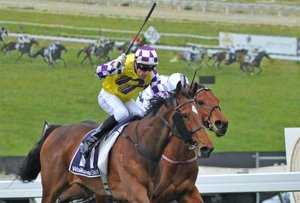
Congratulations Caroline
Caroline Gordon one of our internship graduates, who is now doing a Diagnostic Imaging Residency at The Royal (Dick) School of Veterinary Studies in Edinburgh, recently won the prestigious W.Harker Rhodes Award for the best oral presentation at the International Veterinary Radiology Association Meeting in Australia!! Caroline presented an abstract on cerebellar herniation in dogs.
Well done Caroline! and its great to see yet another MVS graduate doing so well.
